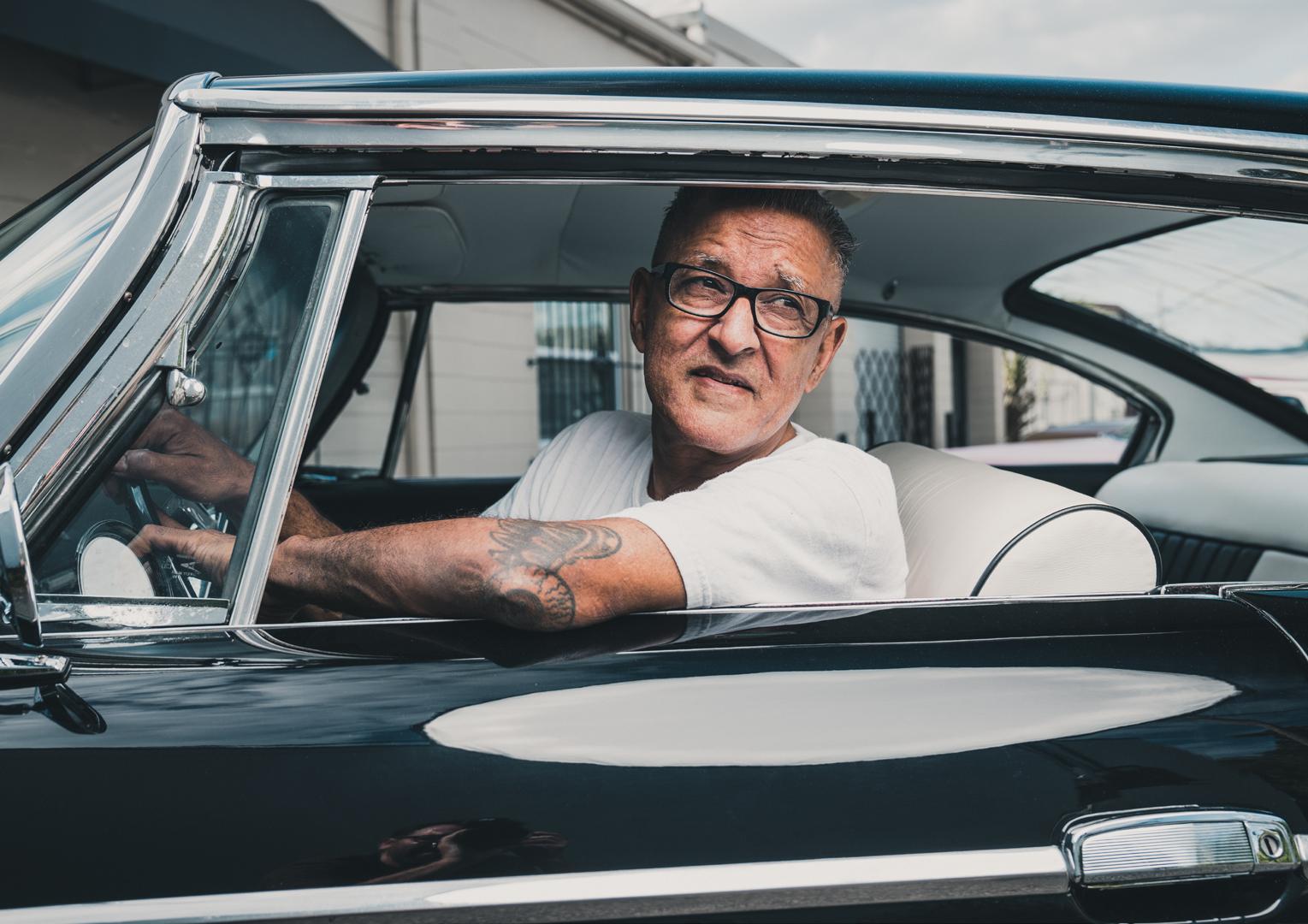
5 minute read
The Music Man Car Guy
Nadeem Khan Builds Bridges that Break Down Barriers
Marc Middleton
Advertisement
Nadeem Kahn puts the OMG in DIY. One day, he brought home the metal needed to build a carport. “My wife immediately said, you’re not capable and nixed the idea,” he recalls. “She was right, but I couldn’t take the metal back, so I used it.” Working in the driveway (a carport would have been nice), Kahn and his son, Miles, used the metal to fabricate the frame for a street rod. Pleased with their ingenuity, they went full blown Dr. Frankenstein; finding, adapting, handcrafting, and cobbling together bits and pieces from dozens of cars: Buicks, Chevys, Fords, Edsels and more. You name it and a piece of it has likely found its way into Kahn’s right-hand drive T-Bucket hot rod complete with a Daimler V8 powertrain.
Kahn’s journey into automotive eccentricity began when he was a teenage boy growing up in England and first saw a concept car called the Lincoln Futura. The Futura was hand built in 1955 at a cost of $250,000 (equivalent to $2,400,000 in 2021). After a successful run on the show circuit, Ford Motor Company sold it to car customizer George Barris for one dollar. In 1965, the producers of a new TV show called Batman asked Barris if he could fabricate “a Batmobile” on a nearly impossible timeline. In two weeks, the Futura became the Batmobile, Barris became famous, and Kahn became hooked on car culture.
“There were no cool cars that you actually saw on the street,” Kahn recalls. “But occasionally, you'd see a big American car and that was mindblowing for a child. You can imagine how my imagination ran wild when my dad, who was quite the storyteller, told me that he was close personal friends with Batman and Robin. He said all he had to do was make a phone call and they'd come over. He was a bus driver. How could he be friends with Batman and Robin? But I was just a child and I really believed him.”

Kahn’s father provided the spark of imagination and curiosity that has defined his life. “He gave me a tin toy, a battery powered Ford Mustang coupe,” he says. “You put it on a table, and it would go to the edge and then back up. It would never fall off. I was determined to figure out how it worked and that's really where everything started. I wrecked a lot of stuff with my own version of reverse engineering.”
Now 60-years-old, Kahn is still collecting cars. He’s still taking them apart and putting them back together. His taste is eclectic. He’s drawn to the everyday British cars he saw as a young boy growing up in England and to the American cars he coveted when his family immigrated to America when he was 19. He owns Cadillacs, an El Camino, an old Plymouth hardtop, and of course, a few hot rods. If he didn’t build them himself, they’re at least 50 or 60 years old. He’s into vintage and drawn to cars in original condition. “I love cars that have lived a life, show some wear, and are still running strong,” he says. They’re beautiful and they make me happy.”
Music Man
Cars are not the only thing that make Kahn happy. Over the years, he’s played in more bands than he can remember. “I’ve been in three or four bands at one time, he says.” His performing pedigree includes stints with Wild Tones, Obliterati, Operation Bell-Bottom, the Delusionaires and Bloodshot Bill. (Yeah, neither had I). But I’m told they all brought something to the party and had passionate, if not large, fan bases.
Kahn’s current band is Big Jef Special. “It’s a cow punk band.” he says. Sensing my confusion, he quickly adds, “You know, country western rockabilly with a punk rock edge.” Of course. What else could it be? He’s played the drums and guitar but these days he’s focused on the standup bass. “I just love playing. Seeing people get excited makes me happy.”
Other than making him happy, I wondered if Nadeem is drawn to some other common thread that might be running through his two very different passions. “Absolutely!” he answers quickly. “Americana! Both are infused with Americana.”
Americana is a blending of many aspects of American culture. In music, it’s the intersection of folk, indie, country, rock, and rhythm and blues. In car culture, it represents individuality, speed, freedom, creativity and risk-taking.
These are the things that defined Kahn’s life from an early age and drew him into two very different cultures that gave an immigrant teenager a sense of belonging. That’s not to say that he hasn’t seen or experienced racism and bigotry, especially in recent years. “I know who the bigots are,” he says. “And some of them are people I’ve known for years. They’re the ‘I don’t like immigrants but you’re OK’ kind of people. They upset me but I can’t cut them out of my life because I’m hoping that I can help open their minds.”
Don’t make the mistake of thinking that Nadeem Kahn is just a music man or a car guy. He’s both but he’s something far bigger and more important. He’s a universal adapter. A bridge between generations, cultures, and ethnicities. He’s someone you can’t help but like and respect when you get to know him and that’s the beauty of shared passions.
People of passion are inevitably, almost irresistibly, drawn to people who share their passion. If we love the same thing, it becomes easier to love one another. In sharing our passions we’re given the gift of time together. We’re exposed to real people and not derisive stereotypes. “Cars and music are everywhere,” Kahn says. “They touch everyone. They bring people together and make room for everyone. I’m just trying to do my part.”










